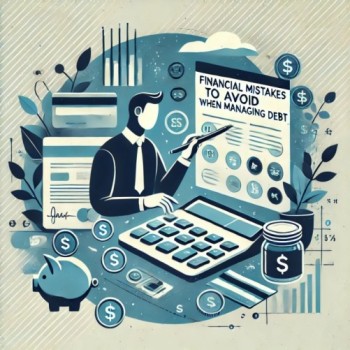Debt management is critical for financial stability and long-term success. However, many people inadvertently fall into classic financial traps that make it difficult to get out of debt. This detailed guide discusses Financial Mistakes to Avoid When Managing Debt and offers effective techniques for staying on track.

Why Debt Managing is Critical
Many people have debt, whether it comes from student loans, credit cards, or mortgages. Debt, when managed correctly, can be used to develop wealth and achieve goals. However, mismanagement can result in:
- Increased financial stress.
- Credit scores were damaged.
- Limited ability to save and invest.
- Difficulty accomplishing goals such as home ownership or retirement.
Understanding and avoiding common mistakes is critical to effective debt management. Here are some hazards to avoid and tactics to implement.
1. Not making a budget
One of the most common mistakes people make while managing debt is failing to develop a budget. It’s difficult to allocate funds for debt repayment if you don’t know what you’re earning and spending.

Why This Matters:
A budget serves as a financial road map, ensuring you have control over your money and can prioritise debt payments.
How To Fix It:
- List all of your income sources.
- Track your monthly spending, separating them into fixed (e.g., rent, utilities) and variable (e.g., dining out, shopping).
- Set aside a percentage of your salary specifically for debt repayment.
Pro tip: To simplify budgeting and track success, use apps such as Mint, YNAB, and spreadsheets.
2. Ignoring High-Interest Debt
High-interest obligations, such as credit card balances, can quickly accumulate if left unchecked. Making only minimum payments lengthens the payback duration and raises the overall cost of debt.
Why This Matters:
High interest rates raise the cost of borrowing, making it more difficult to reach financial freedom.
How To Fix It:
- The debt avalanche strategy prioritises paying off high-interest bills first.
- Consolidate debts into a single loan with a reduced interest rate if you qualify.
Pro tip: Use windfalls such as bonuses or tax refunds to pay down high-interest debt faster.
3. Missed Payments
Missing payments results in penalties, increased interest rates, and a lowered credit score. Regular, on-time payments are crucial for effective debt management.

Why This Matters:
Late payments raise the overall cost of debt and lower your creditworthiness.
How To Fix It:
- Set up automatic payments for at least the minimum balance owing.
- To ensure that payments are made on time, use reminders or calendar alerts.
Pro Tip: If you’re having trouble making a payment, contact your lender to explore options including deferrals or modified payment plans.
4. Adding New Debt While Paying Off Old Debt
Using new loans or credit cards to repay old debt can lead to a difficult-to-break borrowing cycle.
Why This Matters:
New debt raises your overall financial burden, making it more difficult to achieve debt-free status.
How To Fix It:
- Avoid creating new credit accounts while focusing on your current debt.
- Instead of using credit, pay for routine costs with cash or debit cards.
Pro Tip: Create an emergency fund to decrease reliance on borrowing in unforeseen situations.
5. Failure to Understand Loan Terms
Many borrowers sign loan agreements without fully comprehending the details, which can result in surprises like changing interest rates or hidden costs.

Why This Matters:
Unfavourable loan terms might lead to higher payback costs and financial pressure.
How To Fix It:
- Read loan documents thoroughly, paying special attention to interest rates, payback conditions, and penalties.
- Ask your lender to clarify any ambiguous wording.
Pro tip: To minimise variable payments, opt for fixed-rate loans whenever possible.
6. Ignoring a Debt Repayment Plan
Without a defined repayment plan, it is easy to lose track of payments and put off debt payback for too long.
Why This Matters:
A repayment plan gives clarity and incentive, assuring consistent progress towards debt-freedom.
How To Fix It:
- Select a repayment strategy such as the debt snowball approach (paying off smaller bills first) or the debt avalanche method (concentrating on high-interest loans).
- Determine short- and long-term repayment targets.
Pro Tip: Regularly review your plan to account for changes in income or expenses.
7. Paying Off Debt With Retirement Savings
While it may appear to be a fast fix, withdrawing from retirement savings to pay off debt can have serious long-term effects, such as penalties and missed development opportunities.

Why This Matters:
Withdrawing retirement assets jeopardises your future financial stability.
How To Fix It:
- Consider alternative choices, such as debt consolidation or negotiating reduced payments.
- Create a separate emergency fund to prevent tapping retirement accounts.
Pro tip: Use retirement resources as a last resort for debt repayment.
8. Ignoring Professional Advice
Managing debt can be stressful, and neglecting it only makes matters worse. Seeking professional assistance can bring clarity and support.
Why This Matters:
Financial advisers and credit counsellors can provide expert advice and personalised methods.
How To Fix It:
- Consult a financial expert for a thorough debt reduction strategy.
- Contact non-profit credit counselling organisations for free or low-cost assistance.
Pro Tip: Avoid debt settlement companies that charge exorbitant fees and may not produce results.
9. Ignoring Credit Scores
A good credit score is crucial for securing loans, renting apartments, and getting a job.
How to Improve It:
- Pay bills on time to maintain a positive payment history. Keep credit utilisation below 30% of your available limit.
- Avoid closing old accounts as they contribute to credit history length. Pro Tip: Monitor your credit history regularly.
Pro Tip: Regularly check your credit report to find and correct problems.
10. Giving in to Emotional Spending
Emotional spending, or purchasing purchases to relieve stress or boredom, can sabotage debt payback plans.
Why This Matters:
Uncontrolled expenditure increases financial obligations and slows growth.
How To Fix It:
- Identify emotional spending triggers and build more effective coping techniques.
- Stick to your buying list and avoid surfing online retailers without a reason.
Pro Tip: Follow the “48-hour rule”—wait 48 hours before making any non-essential purchases.
11. Failure to negotiate with creditors
Many consumers believe they have little influence over their loan conditions, although creditors are frequently eager to negotiate.

Why This Matters:
Negotiating conditions can make debt repayment easier.
How To Fix It:
- Contact creditors to discuss reduced interest rates, longer payment arrangements, or fee waivers.
- Document all communications to keep track of agreements.
Pro tip: Approach discussions with confidence and provide a reasonable payback proposal.
Building a Debt-Free Future
Avoiding these financial blunders while managing debt will greatly improve your financial situation. Here are some extra actions to assure long-term success.
Build an emergency fund
A financial cushion decreases the need to borrow during unforeseen situations. Begin with a modest goal, such as saving $1,000, and gradually expand it to cover three to six months of spending.
Invest in financial education
Understanding fundamental financial principles allows you to make more informed judgements. Resources such as online classes, books, and seminars can help you expand your expertise.
Celebrate Small Wins
Debt repayment is a long process. To keep motivated, acknowledge and celebrate achievement milestones.
Final Thoughts
Managing debt involves discipline, planning, and endurance. By avoiding common traps and applying these tactics, you may get control of your money and strive towards a debt-free future. Remember, every tiny step counts, and asking assistance when necessary is a show of strength, not weakness.
SavingSecret.in provides further money management suggestions and information. Empower yourself with information to attain financial independence and a secure future.
FAQs
1. What is the greatest way to pay off debt quickly?
The debt avalanche approach, which focuses on high-interest loans, and the debt snowball method, which pays off lesser debts first, are both successful tactics.
2. Can I bargain with creditors to reduce interest rates?
Yes, many creditors are willing to negotiate. Contact them to negotiate cheaper rates or alternative payment methods.
3. Should I avoid using credit cards when repaying debt?
It is essential to limit your credit card use. Concentrate on paying down current bills and using cash or debit for daily spending.
4. How does debt consolidation work?
Debt consolidation combines several loans into a single loan with a possibly lower interest rate, making payments easier.
5. Why is it critical to check credit ratings throughout debt repayment?
Monitoring credit scores allows you to track progress, detect problems, and ensure you’re developing a solid financial history.
Smart Budgeting Tips to Improve Your Financial Health

